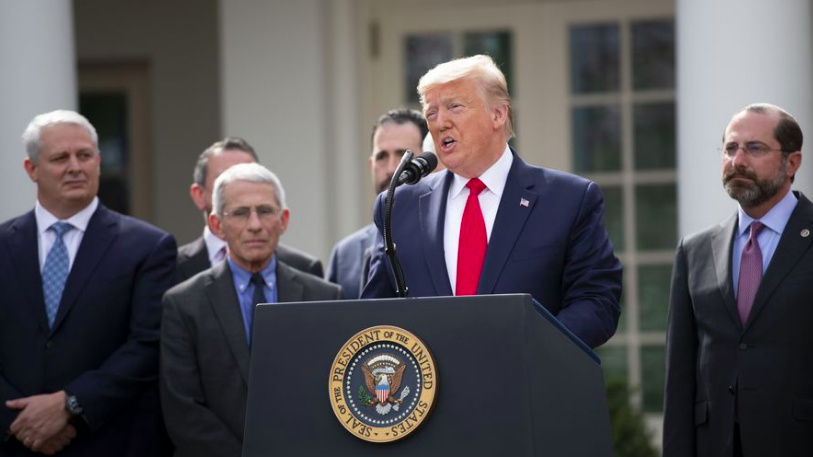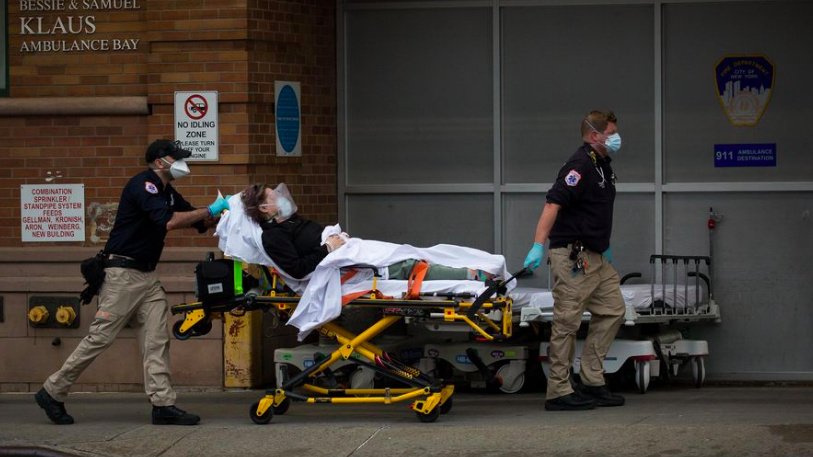
U.S. President Donald Trump addresses a news conference at the White House in Washington D.C., the United States, on March 13, 2020. /Xinhua
U.S. President Donald Trump addresses a news conference at the White House in Washington D.C., the United States, on March 13, 2020. /Xinhua
Editor's note: Sun Chenghao is an assistant research professor at the Institute of American Studies, under the China Institutes of Contemporary International Relations based in Beijing. The article reflects the author's opinion, and not necessarily the views of CGTN.
The current situation of the COVID-19 spread in the U.S. is severe, with confirmed cases and deaths in all states showing an upward trend, and America has become the country with the most COVID-19 infections in the world. Some American medical experts predict that it will take weeks or even months to fully control the epidemic.
U.S. President Donald Trump said in January that everything was under control. But to this day, the country has fallen into a panic in the fight against COVID-19 when medical resources are stretched, and the political decay with American characteristics such as partisan rifts, conflicts between federal and the states government, and electoral politics has greatly affected the country's capability and efficiency to curb the epidemic.
The "political decay" coined by American scholar Francis Fukuyama includes polarization of partisan politics, rise of interest groups, and "vetocracy" in the political system. In the COVID-19 crisis, the political decay of the U.S. is even more vivid.
First, the fierce struggle between the Republicans and Democrats caused the COVID-19 to be politicized at the very beginning, lowering the American public's awareness of the epidemic. Since Trump took office, the partisan struggle has never stopped, which caused deadlock in the Congress and government shutdowns. Democratic lawmakers have repeatedly used "Russiagate" and "Ukrainegate" against the president.
The partisan chaos was extremely apparent in the early stages of the epidemic. Democrats accused Trump of underestimating the threat of the epidemic, and Trump argued that Democrats had politicized the epidemic issue. Trump's response created confusion and uncertainty, exposing the government's inadequate preparation for the outbreak.
It proves that both parties have politicized the epidemic and failed to issue a unified voice to raise the American public's awareness of the real threat of the epidemic. Trish Regan, the Fox News anchor who once supported Trump and refuted the Democrats' exaggeration of the threat of the COVID-19, had to leave the cable network since the public can no longer tolerate the so-called political conspiracy theory fabricated by certain U.S. media.
Second, as a federal country, the U.S. has to face the dilemma of being unable to act unanimously during the crisis. The federal and state governments have inconsistent ideas and policy coordinating nationwide is difficult. After the founding of the United States, the relationship between the federal and the states is by no means a pleasant history.

A patient is transferred to Maimonides Medical Center in Brooklyn of New York, U.S., March 28, 2020. /Xinhua
A patient is transferred to Maimonides Medical Center in Brooklyn of New York, U.S., March 28, 2020. /Xinhua
Especially on issues related to people's livelihood, the federal government has no absolute jurisdiction over states. For instance, after Trump took office, he intended to implement a tougher immigration policy, but was strongly opposed or even resisted by some states.
On the issue of whether to resume work earlier, in order to stabilize the economy, Trump once proposed to end social isolation as soon as possible regardless of the grim reality of the epidemic to achieve early return to work. But this idea has been opposed by some state and local government officials. Several states, including California, New York, Ohio and Pennsylvania, have issued stricter orders to keep social distancing policies. Some states have also delegated the power of social isolation to counties and cities, and have implemented stricter regulations than the federal government.
However, the governors of Florida and Tennessee expressed support for Trump. The phenomenon of multiple policies in a country has left the American people confused when faced with the epidemic, and it is not known whether they should follow the instructions of the federal or local governments.
Third, the outbreak took place during a year when electoral politics has further complicated the administration's response. He declared a national emergency to help handle the growing outbreak of COVID-19, calling himself a "wartime president," and hoped to use the crisis to boost support. Trump has also blamed the Democratic Party and even China for his missteps to combat the virus, intending to win the presidential elections by creating domestic divisions and provoking xenophobia, the same tactics he used in 2016.
Meanwhile, Trump was hesitant to make prompt decisions during the crisis, considering that economic security is more important. U.S. medical materials are in short supply, but Trump did not sign an executive order to invoke the National Defense Production Act until March 18. It is because some large enterprises, worried that the act would harm their interests, lobbied the White House to delay using the Act. In an election year, Trump was obviously more concerned about the gains and losses of those interest groups.
A COVID-19 crisis on this scale may reshape American society and the economy in dramatic ways, and various sectors are actively adjusting to overcome the grim challenge. However, the Trump administration is still taking the same steps, holding on to old-fashioned ideas, which will only accelerate the political decay of the country.
Moreover, the political decay is rightly reflected in U.S. foreign policy. Just as one article in Washington Post said, Pompeo's pandemic performance has ensured his place among the worst secretaries of state ever. Without forming a global alliance to fight against COVID-19, the U.S. was pointing fingers at other countries as scapegoats for its own domestic failures and even taking unilateral actions by imposing travel ban without consultations with its European allies. In this way, the U.S. will only undermine its credit and lose its respect from the rest of the world.
(If you want to contribute and have specific expertise, please contact us at opinions@cgtn.com.)